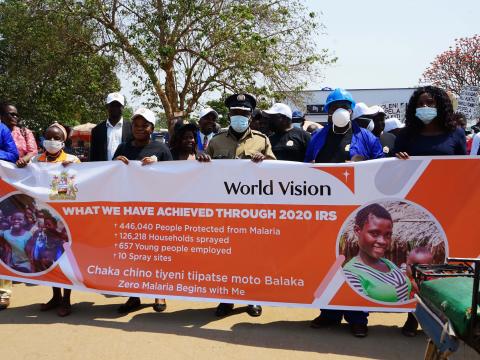World Vision launches 2021 campaign to fight malaria in Malawi

World Vision, on Monday, launched the 2021 Indoor Residual Spraying (IRS) campaign in Malawi, with an appeal to all communities to embrace the intervention. The launch, which was preceded with a solidarity walk from the District Commissioner's Office to Balaka Stadium, reminded people of the dangers of malaria and their role in a successful house spray campaign.
Speaking during the launch, Balaka Council Chairperson, Councilor Patrick Botomani, called for all communities to accept and embrace the intervention as it has proven that it works following this year's malaria trends in the districts of Balaka, Nkhata Bay and Mangochi where World Vision is implementing. “We are aware that up to this time some people still doubt the goodness of IRS. Let me report to you that with this we have managed to reduce malaria cases by 33 percent in Balaka district”, reported Botomani.
Having built partnerships with more stakeholder, including the clergy, Botomani believes that this year, the campaign will yield even better results. “It is our aim and hope that we do more and better this year as we have incorporated different actors at all levels; be it religious, traditional and political- to ensure the intervention is a success. And I would like to thank World Vision for these efforts”, he said.
On his part, Chief of Party for Global Fund grants on malaria and HIV at World Vision, Dr. Biziwick Mwale, said it is the hope of World Vision that by the end of the 36 days of the campaign, over 350,000 under five children will be free from malaria in the three districts.
“For us at World Vision, our focus is the child. When the child is free from malaria and healthy, they will be able to stay in class and get an education. When the mother, father, uncle or aunt are healthy, we know, they will be able to support that child to push for their dreams”, said Mwale before adding that malaria perpetuates poverty and foils development plans at household and community levels.
Mwale also noted: “When a child is sick, the whole family tends to that child. They can’t work on agriculture or participate in the collective development of the community”. He further pointed out that World Vision opted to do IRS in Balaka and the other districts because of the high malaria prevalence rates as reported by the Ministry of Health and National Malaria Control Programme.
“Our hope is that once we register successes in this campaign, then the nation can see how best this fit with the other interventions addressing malaria”, he said.
This year, World Vision is using Fluodora Fusion in Balaka and Mangochi, while Nkhata Bay will use Sumi Shield. The project, which runs to 2023, is being implemented in Mangochi, Balaka and Nkhata Bay (where it is funded by Global Fund) to a tune of 33 million US Dollars.
World Vision’s work in fighting malaria in 2020 safeguarded nearly 2 million people from malaria in Malawi, including 348,000 under five children and 40,080 pregnant mothers.